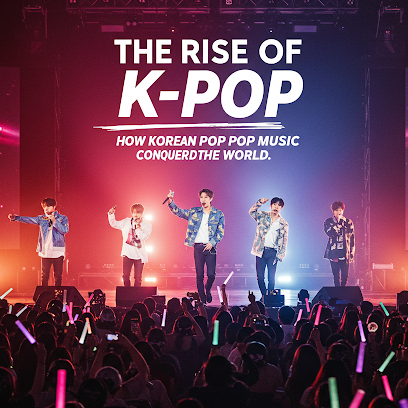
The Rise of K-pop: How Korean Pop Music Conquered the World
K-pop, short for Korean Pop, has become a global musical phenomenon, taking over not only Asia but also North America, Europe, and beyond. From its humble beginnings in the early 1990s to becoming a global cultural export, K-pop has captured the hearts of millions worldwide. This article explores how K-pop conquered the world, the key factors behind its rise, and the groups that paved the way for its international success.
The Early Years: The Birth of K-pop
The roots of K-pop can be traced back to the early 1990s, when the Korean music scene began to shift towards a more Westernized sound. The genre’s initial breakthrough came with the debut of the group Seo Taiji and Boys in 1992. Their fusion of rap, rock, and electronic music brought a new sound to Korea that was fresh and appealing to a younger generation.
However, it wasn’t until the late 1990s and early 2000s that K-pop truly began to gain traction with groups like H.O.T and S.E.S.. These groups captured the attention of fans not only in Korea but also in other Asian countries, sparking the beginning of K-pop’s regional expansion.
The Global Breakthrough: BTS and BLACKPINK
The real breakthrough for K-pop on the global stage came with the rise of BTS and BLACKPINK, two groups that have become synonymous with the genre’s worldwide success.
BTS, also known as the Bangtan Boys, debuted in 2013 under Big Hit Entertainment. Their music, a mix of hip-hop, R&B, and pop, along with their socially conscious lyrics, resonated with fans worldwide. BTS’s fanbase, known as ARMY, has grown exponentially, making them one of the most popular boy bands in the world. Their success includes chart-topping albums, sold-out world tours, and even speeches at the United Nations.
Similarly, BLACKPINK, formed in 2016 by YG Entertainment, has also made a huge impact globally. Known for their fierce performances, catchy music, and powerful female presence, BLACKPINK has shattered records on YouTube, with their music videos often surpassing millions of views within hours of release. Their international collaborations, such as with Selena Gomez and Lady Gaga, have further cemented their global status.
The Role of Social Media and YouTube
Social media has played a pivotal role in K-pop’s rise to global dominance. Platforms like YouTube, Twitter, and Instagram have allowed K-pop groups to directly connect with international fans. Music videos on YouTube have become a primary avenue for K-pop stars to reach a global audience, and many K-pop videos boast billions of views, thanks to the devoted fanbase and the viral nature of the content.
On YouTube, K-pop music videos often set new records. For instance, BTS’s “Dynamite” became the most-viewed music video in 24 hours, surpassing even Western pop stars. Similarly, BLACKPINK’s “Ddu-Du Ddu-Du” and “How You Like That” also broke records for the fastest to reach millions of views.
The K-pop Fandom: A Global Community
The passionate and dedicated K-pop fandoms, such as ARMY (BTS), BLINK (BLACKPINK), and EXO-L (EXO), are key drivers of K-pop’s success. These fan communities are known for their fervent loyalty, creativity, and ability to organize events and campaigns to support their idols.
What makes K-pop fandoms unique is the level of interaction between fans and artists. Social media platforms allow fans to engage with their favorite groups in real-time, creating a sense of closeness and shared experience. The K-pop idols also often show appreciation for their fans, creating a cyclical bond that strengthens the global community.
The Economic Impact of K-pop
The economic impact of K-pop extends far beyond just music. K-pop has become a significant driver of South Korea’s economy. It is estimated that BTS alone contributes billions to South Korea’s economy each year through album sales, concert tours, merchandise, and brand endorsements. K-pop also plays a key role in promoting South Korean culture, food, and tourism, making it a cultural export that boosts the nation’s global presence.
Challenges and Criticism
Despite its immense success, K-pop has faced its fair share of challenges. The intense pressure on idols, the strict training system, and the sometimes controversial nature of the entertainment industry have been sources of criticism. Additionally, K-pop stars often face public scrutiny, and some groups and members have been subject to scandals that affect their reputation.
However, K-pop continues to evolve and adapt, with artists advocating for more freedom of expression and mental health awareness within the industry. The global K-pop community remains resilient, and the genre shows no signs of slowing down.
The Future of K-pop
The future of K-pop looks promising. As the industry continues to grow, more K-pop artists are expected to break into Western markets, and the genre will likely see even more international collaborations. With the rise of virtual idols and the increasing influence of social media platforms like TikTok, K-pop will continue to be a dominant force in the music world.
As K-pop continues to spread its influence, it’s clear that the genre has firmly established itself as a cultural powerhouse with a global following that only continues to expand.
Conclusion
The rise of K-pop is a testament to the power of music in transcending cultural and language barriers. From humble beginnings to global domination, K-pop has changed the music industry forever. With its infectious beats, talented performers, and dedicated fanbase, K-pop will continue to shape global music trends for years to come.


